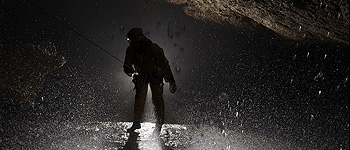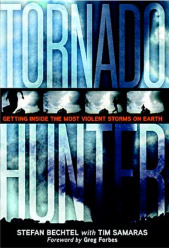|
|

|
 |
 |
 |
 |
 |
 |
Follow Carsten Peter on Twitter >>here |
|
 |
Join Carsten Peter on Facebook >>here |
|
 |
Follow Carsten Peter on Google+ >>here |

 |
|
Check out Geo 1/10: with my exploration story of the deepest and longest cave in Germany called "Riesending"

(deeper than 1km, close to 13km length). It was pretty challenging to realize decent photography under these extreme conditions. Thanks to the marvellous team of Arge Bad Canstatt we shed some light into the most remote and extreme place of Germany. And the cave still shows further leads, there is much more to explore and good potentials for further discoveries! Thanks to the team for all the support for a unique coverage! |

 |
|
 The 2004 article about tornadoes in National Geographic became one of the most widely read in the magazine’s history. Carsten Peter photographed stormchaser Tim Samaras groundbreaking inventions and how he managed to get ingenious equipment in the way of these raging and killing storms. Get more compelling background information now in the new National Geographic book of master storyteller Stefan Bechtel: get hooked to the fascination of stormchasing and how Tim Samaras turned his research into the most adventurous approaches. These incredible powerful forces of nature unfold in: The 2004 article about tornadoes in National Geographic became one of the most widely read in the magazine’s history. Carsten Peter photographed stormchaser Tim Samaras groundbreaking inventions and how he managed to get ingenious equipment in the way of these raging and killing storms. Get more compelling background information now in the new National Geographic book of master storyteller Stefan Bechtel: get hooked to the fascination of stormchasing and how Tim Samaras turned his research into the most adventurous approaches. These incredible powerful forces of nature unfold in:
Tornado Hunter - getting inside the most violent storms on earth. |


 |
|
September:
The opulent coffee table book „Our living planet“ is a official documentation of the WWFs (World Wide Fund for Nature)
and deals with stories of success inmidst all our environmental problems. Carsten Peter traveled long distances for two stories of this book with a positive view - to Tuvalu in the South Pacific and to Kamtchatka, the distant peninsula in Far East Russia.
Tuvalu became a worldwide synonym for future drownage due to global warming. The barely elevated atolls suffer already from springtides. Nevertheless peoples optimism is unbroken and as one of the least developed countries it became the third richest country in the South Pacific and bought the UN membership for 50 million$.
Kamtchatka an untamed paradise and a remote wilderness at the end of the world suffers from organized poaching. Mafialike structures seamed unbreakable, but a little team of WWF supported rangers achieved the unimaginable. With a lot of wits and impressing body skills they expelled successfully the poachers from a natural sanctuary and broke their ties with corrupt officials. |

 |
|
September:
Geo International publishs an interesting article about the Lechuguilla cave, New Mexico. „The second world“ (by Lars Abromeit, photography Carsten Peter) describes a parallel universe of life: despite marginal resources a surprising rich bio diversity is found in the depth of the earth - and its little, exclusivly micro organisms and challenging to detect deep in the caves. Especially Spanish Geo does a more extensive coverage than the German Geo Magazine. Furthermore you find it in Hungary, Brazil, Italy. Russia, Finland, Turkey, Kroatia, Slowakia, Romania, Czech Republic, Bulgaria, India, Latvia, Lithuania and Estonia. |

 |
|
August, 31st:
France, Perpignon: Visa pour l'Image 2009.
The most influencial festival of photojournalists opens with an evening screening at Campo Santo with Carsten Peter images: The breathtaking Crystal Giants story featuring the superheated Naica caves in Northern Mexico, published in November 2008 in National Geographic. |


 |
|
June, 15th:
SuperRTL: Tornados, the Killer storms. This nearly one hour documentary gets you close in the vicinity of tornadoes and makes you familiar, how difficult it is to achieve close datas from these violent storms. Follow also National Geographic photographer Carsten Peter, how he got his groundbreaking images for his awardwinning tornado story. |

 |
|
March 2009
Geo Germany, cover story: The Second World - The Cosmos of the Others. Scientists realize a kind of a parallel universe of live: despite marginal resources a surprising rich diversity is found in the depth of the earth. This abundance is only visible if you dive into the world of micro organisms deep into caves. The micro biologist and young professor Hazel Barton researches since years one of the most spectacular caves in the world - Lechuguilla in New Mexico and uses her speleologic curiosity to explore the last eco niches. What she discovers bursts the imagination and dimension we know from higher organisms: microbes developed entire new physiologic cycles to obtain energy and are masters of economy. They reduce their metabolism to a degree, that they survive extreme shortage of anything. Very different organisms share their work and create strange symbiontic communities to be highly efficient with energy. In contrary to some expectations this deficit even contributes to a higher diversity. The unusual physiology may inherit a high potential for Pharmacy and other industrial appliance. |




 |
|
only till January 4th, 2009 Exhibition:
Ausstellung The Field Museum, Chicago, IL, USA:
Nature Unleashed - Inside natural disasters. Get inside a tornado! The breathtaking video footage of Tim Samaras’ media probe runs in a 360° - installation. It gives you the impression you are sitting in his armored housing and are run over by a F1 tornado at Stormlake / Iowa. You will also see large format tornado prints of Carsten Peter. |
|
 |
 |
 |
 |
|
|